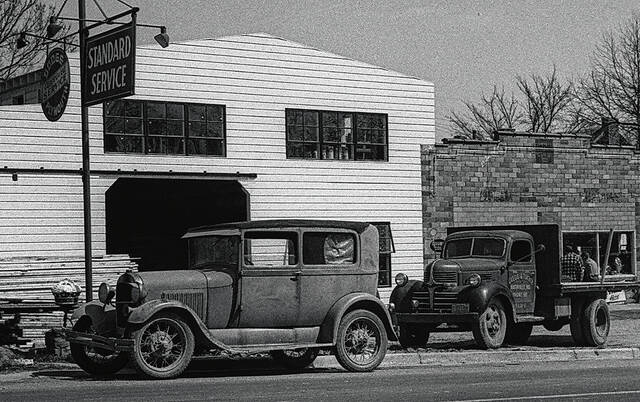
Submitted photo
The Gregg-Tucker station in Morgantown in the 1930s. Bob Gregg and George Tucker opened this station together in 1938. Gregg worked at selling cars and Tucker handled the gas pumps at the garage. Jesse Roush was the mechanic.
EDITOR’S NOTE: This story is a biographical interview with Bob Gregg, by Richard ‘Dick” Reed and appeared in the Brown County Democrat Dec. 5, 1973. This is part one of the Bob Gregg story.
Bob Gregg was born in a cabin in western Brown County, Jackson Township.
His closest buddy was George Tucker, with whom he was associated nearly all of his life.
They were partners for almost 40 years and had worked together even longer, “with no problems,” according to Bob.
“This fall has been rough,” he says. “George died; then Lloyd Heller, who was like a brother to me; then my oldest sister, who lived in California.”
Bob had six brothers and sisters. Of the seven children born to George H. and Belle Martin Gregg, only two are left. They are Bob and his 76-year-old sister, Mrs. Ruth Brown, who lives on a farm near Paragon, Indiana. Bob was the youngest of the seven.
Two years ago, Bob lost his brother, “Butch” — Vernon B. Gregg — of Alfala Acres, along State Road 135 three miles the other side of Morgantown. Vernon had been a grocery man and meat cutter at Morgantown, a farmer and had operated a slaughterhouse. Vernon also had two stores in Indianapolis.
Bob Gregg was born Sept. 1, 1901 on the Veal place, west of the old Billy Smith orchard and west of the old Morgantown to Helmsburg road. The senior Greggs came west from a spot 30 miles from Wheeling, West Virginia.
They left Ohio to homestead in the northwest corner of Nebraska, where they struggled to live for about six years.
“Dad said he had only one crop of wheat during that time,” Bob said.
“I’ve heard him say if he had had two crops, he could have stuck it out in Nebraska. But they came back to Ohio. Then dad and a friend of his bought land in Brown County. That was during the late 1880s during the first term of President Grover Cleveland. Ground sold in Brown County, in those years, for $1 an acre.
Dad farmed some. He also had a stone quarry and a peach orchard. He hauled the stone to Morgantown and furnished practically all of the stone for the stone that’s under the foundations of the old houses in Morgantown. He hauled the peaches to Indianapolis in a spring wagon.
When I was 18, my folks sold the farm and retired in Morgantown. I went to Indianapolis and worked for my brother in a grocery, that winter. The next summer I helped my brother on a farm north of Morgantown for $40 a month and my food and keep.
Then I went to work for Ferd Miller in a grocery store in Morgantown. I did that for a year and a half, then went in with one of the finest men I ever knew, James Fleener of Morgantown. We had a trucking business. We ended up with five trucks and hauled freight and livestock to Indianapolis — also tomatoes in the fall. We worked day and night.
After several years of that, I sold out and built a small garage in Morgantown in 1928. George Tucker had stayed at our house a lot and he was with me in trucks, hauling things. I was married while I was in business with Fleener on Sept. 13, 1924.
My wife is Gerthel Tucker, George’s oldest sister. She was a school teacher in Columbus and her folks lived on a farm south of Trafalgar. Her brother was ‘Doc’ Tucker, a veterinarian over there.
Grethel works at the Gypsy Pot seven days a week. She also worked at the Colonial Restaurant as hostess and cashier until after Jimmy Davis passed away, Jimmy and George were in the antique business.
After I married, I bid on a school bus route and got Grethel a school bus to drive for four years.
When I opened the garage at Morgantown, George came to stay with us. I was a dealer for Hudson and Essex automobiles and was also an associate dealer out of Martinsville for Chevrolet. I worked at selling cars and George handled the gas pumps at the garage. Jesse Roush was the mechanic. George and I opened a filling station where the Roberts Brothers Lumber Company is. We started that station on Dec. 31, 1938.
I sold the Morgantown garage and a brother-in-law of mine, Gilbert Mercer, and I went to Harlingen, Texas in 1928. We worked in a packing house run by a former Hoosier schoolteacher, Levi Snavely, who became president of the citrus fruit growers association. Gilbert had sold his bakery in Trafalgar, but in mid-winter he had to come back home and take it over again.
I came back with him and trucked for a while to the canning factory at Morgantown.”
— Submitted by Pauline Hoover, Brown County Historical Society

